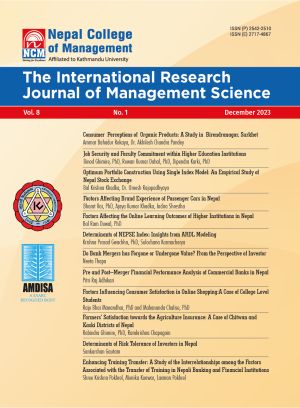Determinants of NEPSE Index: Insights from ARDL Modeling
DOI:
https://doi.org/10.3126/irjms.v8i1.60697Keywords:
NEPSE Index, macroeconomic and bank-specific variables, ARDL, approachAbstract
Background: The stock market, acting as an economic barometer, crucially influences a nation's development by gauging its financial stability. In contrast, sustainable stock market indices have become vital in assessing listed companies' long-term viability and ESG performance.
Objectives: The research aims to uncover the influence of various macroeconomic factors (GDP growth, inflation, broad money supply) and bank-specific indicators (bank stability, funding risk, interest rate) on the NEPSE index.
Methods: This study delves into the determinants shaping the NEPSE index in Nepal, utilizing the autoregressive distributed lag (ARDL) model with annual time series data spanning from 1995 to 2022. The NEPSE index, as a measure of sustainable stock market performance, becomes crucial in understanding market dynamics. This study analyzes the impact of GDP growth, inflation, broad money supply (M2), and bank-specific indicators on the NEPSE index.
Results: The study found that the NEPSE index is positively influenced by GDP growth, broad money supply (M2), and bank stability (BSTAB). Policymakers are urged to focus on fostering GDP growth, implementing effective monetary policies, and enforcing robust banking regulations to create a conducive market atmosphere, thereby inspiring investor trust. Conversely, the study demonstrates that inflation and funding risk (FRISK) exert a negative and significant impact on the NEPSE index. Hence, policymakers and central banks are advised to closely monitor and manage these variables to ensure stability and investor confidence, thereby nurturing a healthy stock market environment.
Conclusion: There is a long-term equilibrium relationship between selected variables and the NEPSE index. Macroeconomic policies and bank-specific quality play an important role in the sustainable NEPSE index.
Implications: The outcomes of this research underscore the importance of maintaining stable inflation rates and effectively managing funding risks and interest rates. By doing so, regulators can facilitate a stable and conducive environment for stock market investments, encouraging economic growth and investor participation. These insights are invaluable for shaping effective policies and regulations, promoting a vibrant stock market, and fostering economic stability in Nepal.




